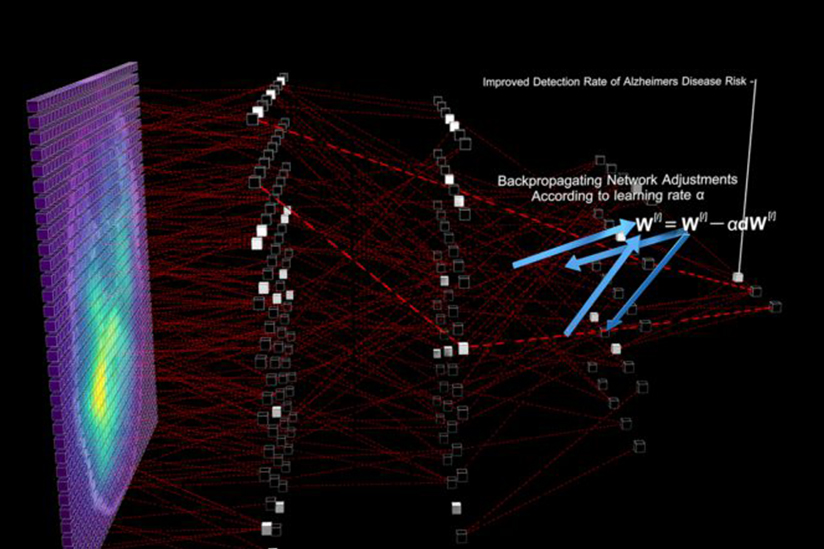Discover how AI is being used to help researchers better understand human health and disease
Since the idea of thinking machines first appeared in literature, artificial intelligence has often been portrayed as a future villain or hero. But the fact is, AI is here now and already suffuses our day-to-day lives. AI keeps people safer while driving. It helps around homes through myriad smart technologies. It answers questions from trivial to profound through search engines.
At the Keck School of Medicine of USC, AI has potential for broader impact still — as an enabling tool for investigations to improve human health. Algorithmic brawn fortifies longtime areas of strength at USC, such as research into cancer, neurodegenerative disease and population health, and aids in snooping out the biomedical needle in the hay.
“Our innovative doctors and scientists are using AI to merge clinical medicine and research,” said Steve Shapiro, MD, USC’s senior vice president for health affairs. “By making sense of real-world data, we may learn things no one else knows. The results could help to individualize health care, to make care more affordable, accessible and equitable, and to create new cures.”
“Our academic enterprise focuses on addressing the most complex challenges to health, and to make progress, we embrace the opportunities presented by advances in computation,”
–Dean Carolyn Meltzer, MD, FACR
Trojan scientists are penning early chapters of a barrier-breaking tale fusing human ingenuity and computational muscle. The lifesaving and life-alerting implications range from new preventive strategies to more-effective drugs, from earlier diagnosis to enhanced critical care.
The right environment for future-forward AI health exploration
What sets the Keck School of Medicine of USC apart in the quest to harness the power of health-related data with machine learning? The investigators setting the stage for tomorrow’s AI-enabled breakthroughs point to several elements that constitute a distinctive edge.
David Conti, PhD, Kenneth T. Norris, Jr. Chair in Cancer Prevention, says that multiethnic research cohorts — including the diverse populations served by USC’s medical teams — and success in community outreach are major advantages.
“I can’t emphasize how important diversity is,” he said. “To get the most out of these AI techniques, you need the right data. And you need community engagement, where USC is making strides forward.”
He also joins others in extolling the collegial, collaborative environment at the medical school, and USC in general. For Arthur Toga, PhD, director of the USC Stevens Neuroimaging and Informatics Institute, the easy flow of information between clinicians, scientists and engineers is imperative.
“For our studies, we need communication about the needs of patients and those who care for them,” he said. “Add to that our close relationship with the USC Viterbi School of Engineering — where I have an appointment — and we have a unique opportunity here.”
Likewise, Paul Thompson, PhD, associate director of the USC Stevens Neuroimaging and Informatics Institute, values the chance to tap the expertise of colleagues at the USC Information Sciences Institute about using machine learning. He sees the community spirit of the Trojan Family as a factor that encourages such connection.
“What’s really special about USC is the positive, friendly communication,” he said. “Compared to other institutions, there’s an ethos where people are willing to help each other out and teach each other a bit.”
Sebina Bulic, MD, director of the stroke neurology service, echoed that value of crossdisciplinary teamwork.
“You need the clinician to identify problems,” she said. “Our engineers are eager to face this challenge. The school’s informatics team is ready. We just need enough clinicians who are curious — or frustrated — about something that can be solved with machine learning.”
“Our academic enterprise focuses on addressing the most complex challenges to health, and to make progress, we embrace the opportunities presented by advances in computation,” said Dean Carolyn Meltzer, MD, FACR, holder of the May S. and John H. Hooval Dean’s Chair in Medicine and professor of radiology. “More and more, our researchers are finding creative ways to channel artificial intelligence to uncover new knowledge and cultivate solutions to the problems that threaten life and erode quality of life. I’m excited to see where these avenues of innovation will lead.”
Read the full story on the Keck School of Medicine of USC’s website
About the image
Illustration of a machine learning network used in neuroimaging. (Courtesy of Jim Stanis and Arthur W. Toga – USC Mark and Mary Stevens Neuroimaging and Informatics Institute)
